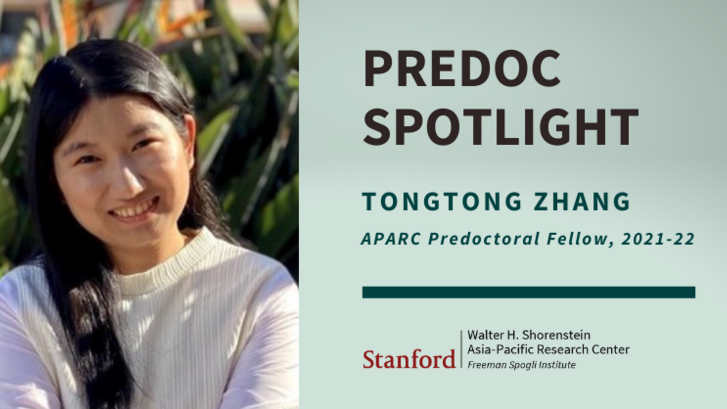NPR's Beijing Correspondent Emily Feng Wins 2022 Shorenstein Journalism Award
NPR's Beijing Correspondent Emily Feng Wins 2022 Shorenstein Journalism Award
Feng, whose compelling and bold reporting has amplified the voices of Chinese citizens amid rapidly deteriorating press freedom in the country, is the recipient of the 21st Shorenstein Journalism Award.

Stanford University’s Walter H. Shorenstein Asia-Pacific Research Center (APARC) is pleased to announce that NPR's Beijing Correspondent Emily Feng is the recipient of the 2022 Shorenstein Journalism Award for excellence in coverage of the Asia-Pacific region. The award recognizes Feng’s eloquent and influential reporting on China amid unprecedented hurdles facing foreign journalists seeking to report in and on the country. She will receive the award at a public ceremony in fall 2022.
Feng, who joined NPR in 2019, roves around China through its big cities and small villages, reporting on social trends as well as economic and political news coming out of Beijing. She contributes to NPR’s newsmagazines, newscasts, podcasts, and digital platforms. Previously, she served as Beijing correspondent for the Financial Times, covering a broad range of topics, including human rights and technology.
Sign up for APARC newsletters to receive our experts' analysis and commentary
During her tenure at the Financial Times, she began to report extensively on the region of Xinjiang, becoming the first foreign reporter to uncover that China was separating Uyghur children from their parents and sending them to state-run orphanages, and discovering that China was introducing forced labor in Xinjiang’s detention camps.
“Emily Feng’s reporting is crucially important journalism that pushes the industry forward and tells powerful stories of Chinese citizens amid intense pressure by the Chinese government over investigative stories on the country,” said Gi-Wook Shin, Shorenstein APARC director. “We applaud her courage and outstanding work and are delighted to recognize her with the Shorenstein Journalism Award.”
Presented annually by APARC, the Shorenstein award, which carries a $10,000 cash prize, honors the legacy of APARC’s benefactor, Mr. Walter H. Shorenstein, and his twin passions for promoting excellence in journalism and understanding of Asia. The selection committee for the award, which unanimously chose Feng as the 2022 honoree, noted that her work embodies the purpose of the award, stating that her reporting on China’s persecution and treatment of the Uyghurs “stands out as some of the most stunning of the past few years.”
The committee members are William Dobson, co-editor of the Journal of Democracy; Anna Fifield, editor of the Dominion Post and Wellington editor for New Zealand's news site Stuff, who is also the recipient of the 2018 Shorenstein Journalism Award; James Hamilton, Hearst Professor of Communication, chair of the Department of Communication, and director of the Stanford Journalism Program, Stanford University; Louisa Lim, senior lecturer, Audio-Visual Journalism Culture and Communication, University of Melbourne; and Raju Narisetti, Publisher, McKinsey Global Publishing, McKinsey and Company.
Feng's reporting has let her nerd out over semiconductors and drones, travel to environmental wastelands, and write about girl bands and art. She has filed stories from the bottom of a coal mine, the top of a mosque in Qinghai, and from inside a cave Chairman Mao once lived in. Her human rights coverage has been shortlisted by the British Journalism Awards in 2018, recognized by the Amnesty Media Awards in February 2019, and won a Human Rights Press merit that May. Her radio coverage of the coronavirus epidemic in China earned her another Human Rights Press Award, was recognized by the National Headliners Award, and won a Gracie Award. She was also named a Livingston Award finalist in 2021.
Feng graduated cum laude from Duke University with a dual B.A. degree from Duke's Sanford School in Asian and Middle Eastern studies and in public policy.
Twenty journalists previously received the Shorenstein award, including most recently Swe Win, editor-in-chief of the independent Burmese news organization Myanmar Now; Tom Wright, co-author of the bestseller Billion Dollar Whale and a veteran Asia reporter; and Nobel Laureate Maria Ressa, CEO and executive editor of the Philippines-based news organization Rappler.
Information about the 2022 Shorenstein Journalism Award ceremony and panel discussion featuring Feng will be forthcoming in the fall quarter.



